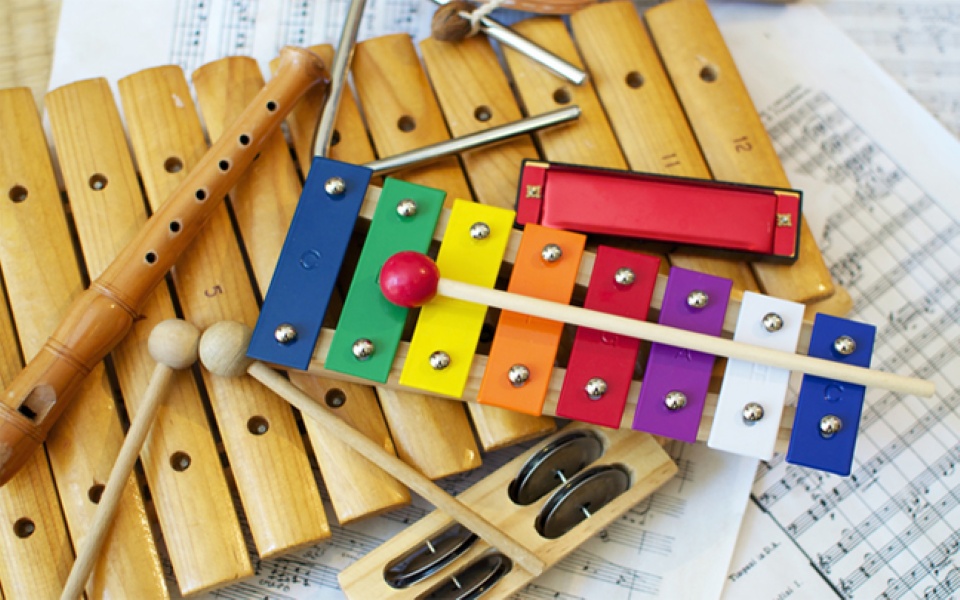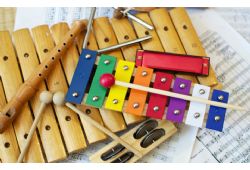If you were to take a survey of current elementary and high
school students asking them what their favourite subjects are, you’d probably
get two types of students; the ones that like math and science, and the ones
that like English and history. Sometimes though, you may get a student who
would yell ‘recess’ a little too enthusiastically.
For those
students whose favourite subject is indeed recess, you may presume they don’t
like school all that much, how do you get them more engaged in their classes?
For Peter
Katz, a Montreal-born, Toronto-based singer-songwriter, music programs in
primary and secondary education could be a way for students to stay out of
trouble.
“A lot of my
friends who have gone on to become successful musicians were not necessarily
the best students. I happen to be good in math and science, it was easy for me,
but it didn’t nourish me the way that music nourishes me. Some of my friends
that probably would have gotten into a lot of trouble [in school], had band or
they wanted to practice their instrument. It gave them something to do other
than go get into trouble. And it also gave them a sense of self, a sense of
confidence, a sense of ‘hey, I’m good at something.’”
Music
education is one of many programs that could get students to want to be in
school. In Quebec, and in Canada in general, funding for music programs has
always been an issue, however. For example, according to a 2010 study done by
the Coalition for Music Education in Canada called A Delicate Balance; Music Education in Canadian Schools,
“funding and lack of time/timetable pressures are the most significant
challenges in implementing high-quality music opportunities in schools; 26 per
cent of schools ranked funding as the most important challenge faced in their
music education programs, and 24 per cent of schools ranked lack of
time/timetable pressures as the most important challenge.”
The study
also says that music “is taught as part of a more general arts curriculum” in
only 23 per cent of schools across Canada, and only in 15 per cent of schools
in Quebec.
At the Sir
Wilfrid Laurier School Board whose schools are located in the Laval, the
Laurentides, and the Lanaudière regions, 14 of their 26 elementary schools
teach music, while six of their 10 high schools teach music, according to
Jacques Tardif, a music teacher at Mother Teresa Junior High.
Tardif says
that music programs are too expensive to maintain and therefore haven’t been
updated in decades.
“The way it’s
being taught right now at McGill for example, hasn’t changed in 100 years,” he
says. “We are not where the kids are anymore, we are not servicing the
population properly. […] [The kids] are not interested in this.”
Tardif then
states that “Music education has not adapted itself to the new world.” He goes
on to explain, “If you were here in the room where I stand, you would see
something that very, very few schools have. I have a music program that I
started in 1990, but in 2004, after 14 years of work, we got it totally
transformed. It is now a class of 32 computers, with 32 keyboards. In 2005,
there was a profile of our music lab on the Apple website as one of the world’s
leading music programs in junior high school. And what we did back then was we
actually transformed music education in our school to adapt ourselves to the
new reality. This music program is growing, it’s healthy. A lot of music
programs in the schools, it’s not even a full load for the teacher. This music
program grew beyond the full load.”
For Chantal Cyr, the director of Vimont Musique in Laval,
she believes Canada just doesn’t take music and the arts in general, as
seriously in their schools as in the United States.
“You see
what the States are doing,” she says. “Our students, or our children, our
artists, do not measure up. They really don’t. I mean if you just compare the Broadway
scene in the States compared to the Broadway scene here, it’s not the same.
It’s definitely not the same quality. You go see a Broadway show in New York
with a bunch of children in it, and you try to do the same show here in
Montreal, you’d have a much harder time finding the talent that they do there.
And I think a lot of that has to do with […] being able to work with the
children at a much higher level than we can. We do find a lot of schools where
administration and the whole organization of the schools don’t believe that the
arts are as important the sciences, math, French and English; and it’s too bad
because it’s a really big part of a child’s development.”
Katz
agrees with Cyr that music can go a long way in a young kid’s life.
“Music
provides so many things for young people. As soon as I started playing an
instrument, I was never bored, ever. […] It gives you a purpose in your time.
You always have a new goal because first you learn the really really easy songs
and then you try to learn the next harder one. Whatever it is there’s always so
much to learn with instruments. Obviously it’s a great creative outlet,” says
Katz.
Katz explains that for him it was an opportunity to start
writing and expressing himself. It was also how he related to a lot of his
favourite artists. Being in a band when he was a teenager was also a great
experience for Katz. “You develop your confidence, putting yourself up there
and singing in front of people. You learn how to work together. You’re just
using your brain in a really productive way versus sitting around doing nothing,”
he adds.
“I
think it just offers so many great benefits,” Katz concludes. “And it’s a shame
there’s shortsightedness in cutting that.”

 In The Latest Issue:Latest Issue:
In The Latest Issue:Latest Issue:
- A Bittersweet Farewell
- The new Laval Aquatic Co...
- The End of an Era:
Articles
Calendar
Virtual- ANNUAL TEACHER APPRECIATION CONTEST
- APPUI LAVAL
- ARTS & CULTURE
- CAMPS
- CAR GUIDE
- CCIL
- CENTENNIAL ACADEMY
- CHARITY FUNDRAISING
- CITYTV
- COSMODÔME
- COMMUNITY CONNECTIONS
- COVER STORY
- DINA DIMITRATOS
- ÉCOLE SUPÉRIEURE DE BALLET DU QUÉBEC
- EDITORIALS
- ÉDUCALOI
- EDUCATION
- EMPLOYMENT & ENTREPRENEURSHIP
- FÊTE DE LA FAMILLE
- FÊTE DU QUARTIER SAINT-BRUNO
- FAMILIES
- FESTIVAL LAVAL LAUGHS
- FÊTE DE QUARTIER VAL-DES-BRISES
- FINANCES
- GLI CUMBARE
- GROUPE RENO-EXPERT
- HEALTH & WELL-BEING
- 30 MINUTE HIT
- ANXIETY
- CHILDREN`S HEALTH & WELLNESS
- CLOSE AID
- DENTAL WELLNESS
- EXTREME EVOLUTION SPORTS CENTRE
- FONDATION CITÉ DE LA SANTÉ
- GENERAL
- HEARING HEALTH
- MESSAGES FROM THE HEALTH AGENCY OF CANADA
- MENTAL HEALTH
- SEXUALITY
- SOCIAL INTEGRATION
- SPECIAL NEEDS
- TEENS
- THE NUTRITION CORNER
- THE NUTRITION CORNER - RECIPES
- VACATION DESTINATION
- WOMEN'S FITNESS
- WOMEN'S HEALTH
- HILTON MONTREAL/LAVAL
- HOME & GARDEN
- INTERNATIONAL WOMEN'S DAY
- JAGUAR LAVAL
- LAVAL À VÉLO
- LAVAL FAMILIES TV SHOW
- LAVAL FAMILIES MAGAZINE CARES
- LAVAL URBAN IN NATURE
- LE PARCOURS DES HÉROS
- LES PETITS GOURMETS DANS MA COUR
- LEON'S FURNITURE
- LEONARDO DA VINCI CENTRE
- LFM PREMIERES
- LIFE BALANCE
- M.P. PROFILE
- MISS EDGAR'S AND MISS CRAMP'S SCHOOL
- MISSING CHILDREN'S NETWORK
- NETFOLIE
- NORTH STAR ACADEMY LAVAL
- OUTFRONT MEDIA
- PASSION SOCCER
- PARC DE LA RIVIÈRE-DES-MILLE-ÎLES
- PÂTISSERIE ST-MARTIN
- PIZZERIA LÌOLÀ
- PLACE BELL
- PORTRAITS OF YOUR MNA'S
- ROCKET DE LAVAL
- SACRED HEART SCHOOL
- SCOTIA BANK
- SHERATON LAVAL HOTEL
- SOCIÉTÉ ALZHEIMER LAVAL
- STATION 55
- STL
- SUBARU DE LAVAL
- TECHNOLOGY
- TEDXLAVAL
- TODAY`S LAURENTIANS AND LANAUDIÈRE
- TODAY`S LAVAL
- WARNER MUSIC
- THIS ISSUE
- MOST RECENT
Magazine
Music: it builds confidence, improves literacy, and inspires a creative spirit
Articles ~e 105,7 Rythme FM 4 chemins Annual Teacher Appreciation Contest Appui Laval Arts & Culture Ballet Eddy Toussaint Camps THIS ISSUE MORE...
CONTESTS Enter our contests
CONTESTS Enter our contests
CALENDAR
Events & Activities
COMMUNITY Posts Events
PUBLICATIONS Our Magazine Family Resource Directory
LFM BUSINESS NETWORK Learn more
COUPONS Click to save!
COMMUNITY Posts Events
PUBLICATIONS Our Magazine Family Resource Directory
LFM BUSINESS NETWORK Learn more
COUPONS Click to save!
SUBSCRIPTIONS
Subscribe to the magazine
Un-Subscribe
E-NEWSLETTER Subscribe to our E-newsletter Un-Subscribe
WRITE FOR US Guidelines & Submissions
POLLS Vote today!
E-NEWSLETTER Subscribe to our E-newsletter Un-Subscribe
WRITE FOR US Guidelines & Submissions
POLLS Vote today!
ADVERTISERS
How to & Media guide
Pay your LFM invoice
SUGGESTIONS Reader's Survey Suggest a Listing
LFM About Us Our Mission Giving Back Contact Us
SUGGESTIONS Reader's Survey Suggest a Listing
LFM About Us Our Mission Giving Back Contact Us
 PICK-UP LOCATIONS
Get a copy of LFM!
PICK-UP LOCATIONS
Get a copy of LFM!
TERMS & CONDITIONS Privacy | Terms
ISSN (ONLINE) 2291-1677
ISSN (PRINT) 2291-1677
Website by ZENxDESIGN



 BY:
BY: 
Tweet
Share